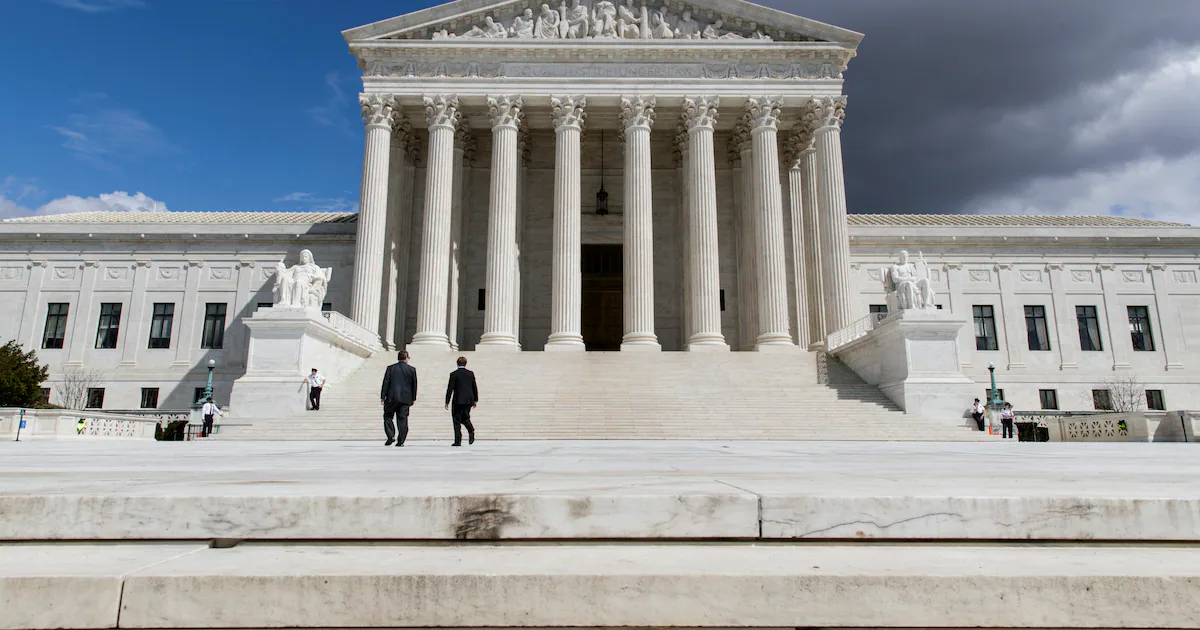
The Supreme Court on Wednesday grappled with whether to allow an Illinois congressman and others to go forward with a lawsuit challenging the state’s policy of counting mail-in ballots that arrive after Election Day.
The case has potential implications for similar legal efforts by allies of President Donald Trump to stop the practice in a handful of states led by Democrats.
Most justices appeared skeptical during arguments about Republican Michael Bost’s contention that he had standing to sue, or had suffered sufficient harm necessary to bring legal action, simply because he was a candidate on the Illinois ballot. They seemed less unified over how much and what type of harm he or another candidate would need to show to go forward with a case.
The question before the justices Wednesday was a narrow one – whether Bost had met the basic legal threshold to bring his lawsuit – not the legality of the Illinois law, which allows the state to count ballots that arrive up to 14 days after the polls close as long as they are postmarked by Election Day.
The case is significant because it could clear the way for Bost to sue and affect similar cases being brought by conservatives elsewhere around the country. Trump has falsely blamed mail-in ballot fraud as costing him the presidential election in 2020, and many conservatives view expansive mail-in balloting rules as favoring Democrats. It could also open the door to more election challenges.
“It’s tough to see where they’ll actually go,” said Matthew Shapanka, an attorney with Covington who works on issues at the intersection of law, policy and politics. “There was disagreement about the breadth of what candidate standing would look like.”
Bost, a six-term congressman, and Illinois presidential electors in the 2020 election asked the high court to overturn lower-court rulings dismissing their lawsuit, which argues that federal law prohibits mail-in ballots from being counted after Election Day. They challenged the counting in a pair of elections.
Paul Clement, an attorney for Bost, argued that any candidate on the ballot inherently has standing to sue over election procedures, that Bost incurs financial harm by having to keep campaign staff on during the two-week period of mail-in ballot counting, and that his client could suffer reputational harm by mail-in ballots reducing his margin of victory. As Clement put it, “those on the ballot are not mere bystanders.”
Conservative and liberal justices on the court roundly rejected his first argument.
“You have to show something,” Justice Elena Kagan said during nearly two hours of arguments. “It’s not enough to walk in and to say, ‘I’m a candidate, and I’m suing.’”
Kagan and her two liberal colleagues were also skeptical of Bost’s other arguments.
“I guess I’m a little concerned about in your argument is the idea that a candidate who wins and who wins by some margin is harmed by a regulation of this nature because of the potential decrease in his margin of victory,” Justice Ketanji Brown Jackson told Clement. “I don’t understand the harm that necessarily comes from that.”
To bring a case in federal court, a plaintiff must allege an injury, describe the harm that resulted from the defendant’s conduct and indicate how their request will redress the injury. The Supreme Court has found any harm must be “concrete and particularized” and must be imminent, not simply hypothetical.
Several of the court’s more conservative justices appeared sympathetic to Bost’s arguments and expressed concerns about the courts being forced to intervene in contested elections. Justice Samuel A. Alito Jr. said it was “straightforward” that Bost would have standing because he would suffer financial harm by having to keep campaign staff on longer.
Chief Justice John G. Roberts Jr. said Illinois’ conception of the case might mean candidates don’t have standing to challenge election rules until the campaigning or once post-election counting begins. He said that could force the courts into the position of making decisions in the heat of campaigns.
“What you’re sketching out for us is a potential disaster,” Roberts said. “It’s going to be in the middle, the most fraught time for the court to get involved in electoral politics.”